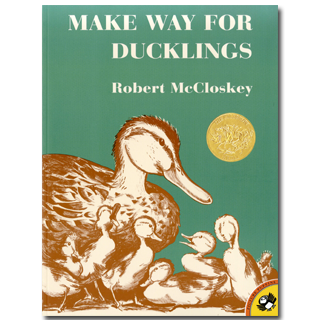 This is one of those summers when it seems to help to remember Anita Silvey's story at the Book-a-Day Almanac of Robert McCloskey sitting in his apartment in New York City trying to draw a couple of ducks he had adopted. It must have been around 1939. The Nazi army was on the march. People were suffering in many places.
This is one of those summers when it seems to help to remember Anita Silvey's story at the Book-a-Day Almanac of Robert McCloskey sitting in his apartment in New York City trying to draw a couple of ducks he had adopted. It must have been around 1939. The Nazi army was on the march. People were suffering in many places.But Robert McCloskey wanted to tell a story about a family of ducks finding a home. I have wondered many times if he ever had doubts about this work, these ducks. And if he did, how did he overcome them? I'm glad he did. How many hundreds of thousands of kids have loved the story of Jack, Kack, Lack, Mack, Nack, Oack, Pack, and Quack? And a story of family finding home is just what we need for the hard times.
These are hard times, too. So much horror. So much suffering. Every week brings a new outrage.
In "The Testing Tree" Stanley Kunitz writes:
In a murderous time
the heart breaks and breaks
and lives by breaking.
It is necessary to go
through dark and deeper dark
and not to turn.
I am looking for the trail.
Where is my testing-tree?
Give me back my stones!
Perhaps what we do in a summer like this, while "looking for the trail," is just keep doing, writing our stories, picking tomatoes, saving seeds, showing up. Saving seeds is a balancing thing. We look at the mucky water, the mess, and hope that something will come of that, something nourishing, something that reminds us that the earth is a place of gifts, too. It seems trite, perhaps too easy, to say that stories are balancing things. But they are. When my brother used to be upset as a child the old uncle who lived with us would tell him a story of a fishing trip they were going to take. They'd discuss the bait, they'd talk about the fish, they'd talk about the stream. They planned that trip many times. And they never took it. We love to think of getting away--and coming home to Boston Gardens, of triumph over difficulty, of a good stone soup made with neighbors who thought they had nothing to share, of a woman who sowed lupine seeds, of a Knufflebunny found.
What we put against the dark is the best work we can do--out of the mucky fermenting, the slime, we hope to make something good.
Before we sharpen the pencils and go back to work, how about a song from Harry Belafonte and the Muppets? It works for all times--especially the hard ones.




